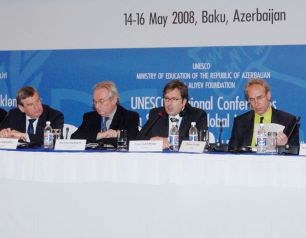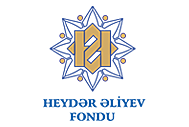
UNESCO`s 5th regional conference to support literacy in the world continued in Baku
The 5th regional conference “Addressing Literacy Challenges in Europe with Sub-Regional Focus: Building Partnerships and Promoting Innovative Approaches” held in Baku by UNESCO, Heydar Aliyev Foundation and Ministry of Education of Azerbaijan was continued on May 15.
Round Table ‘Concept of literacy in the modern world, its development and adult training’ was held first. Opening the discussions Director of the UNESCO Lifelong Education Institute Adama Owen said major attention will be directed to the idea of literacy in Europe, its development, adult education in the prospect of lifelong learning. Views said will be used in making of policies and strategies. It will help all the members of the society obtain major skills and inspire development. Taking into consideration the state of literacy in European countries, much more attention is paid now to adult literacy programmes. Noting extra skills are required to have a successful and responsible life, take an effective part in the society, meet requirements of the modern time and future A.Owen said on this point main objective of literacy and adult training is development of main skills of individuals for assessment, management, integration and mutual influence. Certainly, these skills do not include cognitive components such reading, writing, scientific literacy, mathematic knowledge, language skills. However, rapid social and technological changes, globalization of economy and culture, growth of diversity, competition and liberalization, social inequality, conflicts and all forms of poverty demand people to have such skills that go beyond the frame of the technical communication skills. Potential fruits of skills assure successful participation of people in labor market, political processes and social networks. As the fundamental human right the literacy is not objective but a means for active participation in individual and public life, interference in social life, economic and humanitarian development, as well self-confidence and decision-making.
UNESCO expert Aaron Benavot, Director of the Netherlands Writing and Reading Foundation Margaret de Vrays, President of European Adult Education Association Yanosh Yigeti Tot, Representative of the European Commission Education and Culture Department Marta Ferreira addressed the Round Table, informed of studies implemented by bodies they represent and their results. They mentioned definition of the idea of literacy in EU countries is different. But requirements for adequate literacy to cope with personal, public and economic problems are the same.
It was noted there are 80 mln low-educated workers in Europe and they form the one third of total workforce. According to calculations, till 2010 people with primary education will be able to work only in 15% of workplaces to be created. 50% of workplaces will require high-qualified employees. This situation brings to violation of rights of a lot of people in EU countries. Modern labor market offers too limited amount of workplaces for people with low literacy. To assure actual possibility of possession of every person of market skills is one of major issues of the Education and Training Work Programme of Education Board till 2010. Assurance of opportunity of lifting and approving market skills of adults in Europe is one of themes of the Adult Education Action Plan of European Commission.
Questions of participants were in detailed replied in the Round Table, views were exchanged on the theme.
After the break, the conference was continued by discussions in working groups on the themes ‘Literacy in the family and intergeneration learning’ under chairmanship of UNESCO Goodwill Ambassador, Princess Firyal of Jordan, ‘Literacy and education for sustainable development’ under chairmanship of UNESCO Goodwill Ambassador Mrs Vigdos Finnbogadottir and ‘Literacy in health care’ under chairmanship of representative of Rotary International Orschelik Balkan.
The same day second Round Table ‘Definition and valuation of literacy levels and basis skills’ was held under chairmanship of Deputy Director General of UNESCO Nicholas Boernet.
Nicholas Boernet underlined modern criteria for valuation of literacy direct attention not only to registration of participants of the school and literacy programs but also to assessment of different levels and types of skills, application of skills in everyday life. Such skill is directed from finding out skills and habits of person required for writing and reading to the study of the skill of being correctly directed in modern scientific societies. So, it is not enough to speak only of literate-illiterate position in assessment of literacy, other details must be taken into consideration too. Valuation of the level of literacy must assure access of different groups of population to information on their need for education.
Representative of Canada Statistics Department Ivan Clermont, Andres Kangro from Latvia, Jean Pierre Jeanto from France, Marina Kuznetsova from Russia, Ireneush Bialetsky from Poland talked in the Round Table about the theme, shared their experience on development and use of assessment of literacy. They gave samples from results of valuation carried out in sub-regions, talked of use of literacy programmes in identification of policy and action frame, extra information required, discussed future international and domestic plans for creation and use of information on assessment of literacy in Europe.




